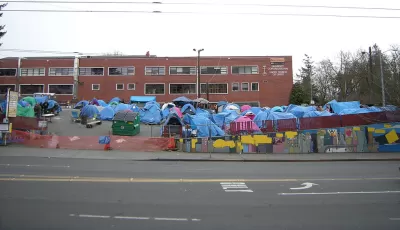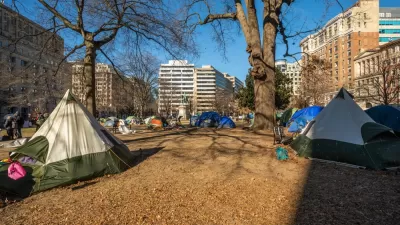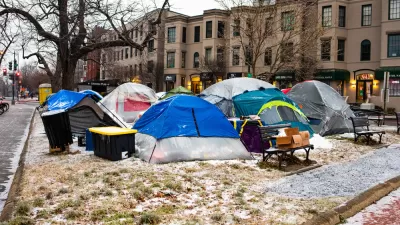Weeks after federal officials evicted unhoused people from a Washington, D.C. park, research indicates that similar actions, which usually come at a high cost to cities, have little impact on homelessness in the long term.

A report from the Department of Housing and Urban Development (HUD) and the Department of Health and Human Services (HHS) finds that ‘sweeps’ of homeless encampments, in which officials displace residents from established encampments, are “expensive and often of limited long-term effectiveness,” despite their popularity with many local politicians responding to pressure from community groups. Karen Kroll describes the report’s findings in Smart Cities Dive.
According to critics of the policy, “A sweep that doesn’t include services to help homeless individuals transition toward more permanent housing does little to address the underlying challenges that led to the encampment in the first place, say advocates for people who are homeless.” In the worst cases, “A sweep can set back individuals who were moving toward housing stability and, perhaps, working with a caseworker who knows where to find them.”
Activists say sweeps can be made less disruptive by providing ample notice, “intentional relationship-building” with residents to connect them to resources and services, and working with residents to help them keep their belongings, which often include important items like driver’s licenses. The report highlights a successful example from Denver, where, out of 360 people housed through a supportive housing program, 77 percent remained in stable housing three years later. “As the Denver experiment revealed, providing services that connect individuals to permanent housing is more effective than just clearing homeless encampments, a senior HUD official said.”
FULL STORY: Homeless encampment sweeps costly and of limited long-term effectiveness, according to federal research

Alabama: Trump Terminates Settlements for Black Communities Harmed By Raw Sewage
Trump deemed the landmark civil rights agreement “illegal DEI and environmental justice policy.”

Planetizen Federal Action Tracker
A weekly monitor of how Trump’s orders and actions are impacting planners and planning in America.

The 120 Year Old Tiny Home Villages That Sheltered San Francisco’s Earthquake Refugees
More than a century ago, San Francisco mobilized to house thousands of residents displaced by the 1906 earthquake. Could their strategy offer a model for the present?

Ken Jennings Launches Transit Web Series
The Jeopardy champ wants you to ride public transit.

BLM To Rescind Public Lands Rule
The change will downgrade conservation, once again putting federal land at risk for mining and other extractive uses.

Indy Neighborhood Group Builds Temporary Multi-Use Path
Community members, aided in part by funding from the city, repurposed a vehicle lane to create a protected bike and pedestrian path for the summer season.
Urban Design for Planners 1: Software Tools
This six-course series explores essential urban design concepts using open source software and equips planners with the tools they need to participate fully in the urban design process.
Planning for Universal Design
Learn the tools for implementing Universal Design in planning regulations.
Clanton & Associates, Inc.
Jessamine County Fiscal Court
Institute for Housing and Urban Development Studies (IHS)
City of Grandview
Harvard GSD Executive Education
Toledo-Lucas County Plan Commissions
Salt Lake City
NYU Wagner Graduate School of Public Service





























